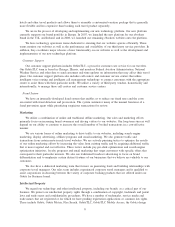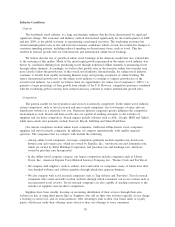Orbitz 2009 Annual Report Download - page 18
Download and view the complete annual report
Please find page 18 of the 2009 Orbitz annual report below. You can navigate through the pages in the report by either clicking on the pages listed below, or by using the keyword search tool below to find specific information within the annual report.In addition, we rely on a group of business process outsourcing companies based in India to provide us
with call center and telesales services, back office administrative services such as ticketing fulfillment, hotel
rate loading and quality control, loyalty program support and information technology services, as well as
financial services such as accounts payable processing and bank reconciliations. Any interruption in these
third-party services could have a material adverse effect on us.
Further, we currently utilize GDSs, including Worldspan, Galileo and Amadeus, to process a significant
portion of our bookings, and any interruption or deterioration in our GDS partners’ products or services could
prevent us from searching and booking airline and car rental reservations, which would have a material
adverse effect on our business.
Our success is dependent on our ability to maintain relationships with our technology partners. In the
event our arrangements with any of these third parties are impaired or terminated, we may not be able to find
an alternative source of systems support on a timely basis or on commercially reasonable terms, which could
result in significant additional costs or disruptions to our business. In addition, some of our agreements with
third-party service providers can be terminated by those parties on short notice and, in many cases, provide no
recourse for service interruptions. A termination of these services could have a material adverse effect on our
business, financial condition and results of operations.
System interruptions and the lack of redundancy may cause us to lose customers or business opportunities.
Our inability to maintain and improve our information technology systems and infrastructure may result
in system interruptions. System interruptions and slow delivery times, unreliable service levels, prolonged or
frequent service outages, or insufficient capacity may prevent us from efficiently providing services to our
customers, which could result in our losing customers and revenue or incurring liabilities. In addition to the
risks associated with inadequate maintenance or upgrading, our information technologies and systems are
vulnerable to damage or interruption from various causes, including:
• natural disasters, war and acts of terrorism;
• power losses, computer systems failure, Internet and telecommunications or data network failures,
operator error, losses and corruption of data, and similar events;
• computer viruses, penetration by individuals seeking to disrupt operations or misappropriate information
and other physical or electronic breaches of security; and
• the failure of third-party systems or services that we rely upon to maintain our own operations.
We do not have backup systems for certain critical aspects of our operations. For example, if we were
unable to connect to certain third-party systems, such as GDSs, due to failure of our systems, our ability to
process bookings could be significantly or completely impaired. Many other systems are not fully redundant,
and our disaster recovery planning may not be sufficient. In addition, we may have inadequate insurance
coverage or insurance limits to compensate for losses from a major interruption, and remediation may be
costly and have a material adverse effect on our operating results and financial condition. Any extended
interruption in our technologies or systems could significantly curtail our ability to conduct our businesses and
generate revenue.
We depend on our supplier relationships and adverse changes in these relationships or our inability to enter
into new relationships could negatively affect our access to travel offerings and reduce our revenue.
In addition to airlines, we rely significantly on our relationships with hotel and other suppliers. Adverse
changes in any of these relationships, or the inability to enter into new relationships, could negatively impact
the availability and competitiveness of travel products offered on our websites. Our arrangements with
suppliers may not remain in effect on current or similar terms, and the net impact of future pricing options
may adversely impact our revenue. In addition, suppliers are increasingly focused on driving online demand to
their own websites. Suppliers typically do not charge a service fee for booking products on their own websites,
and as a result, their travel offerings may be more attractive to consumers.
18
























